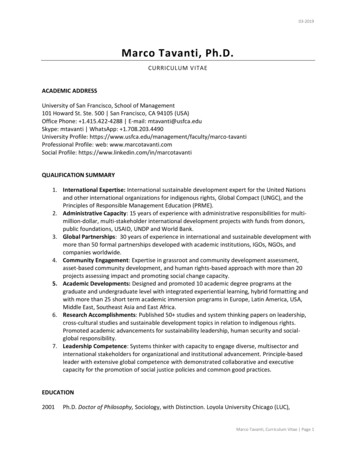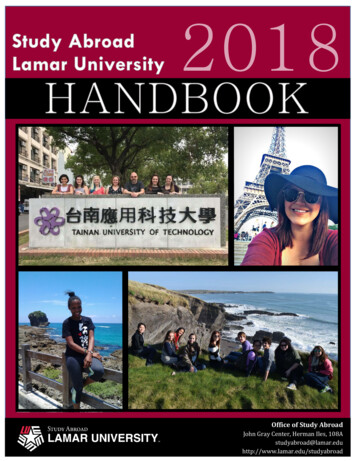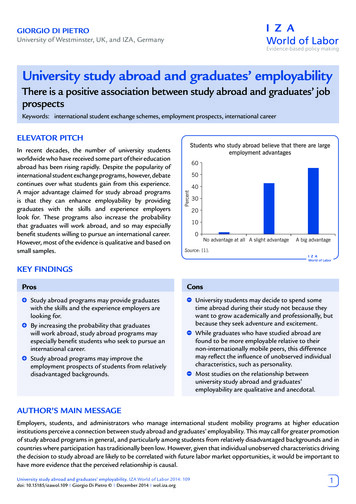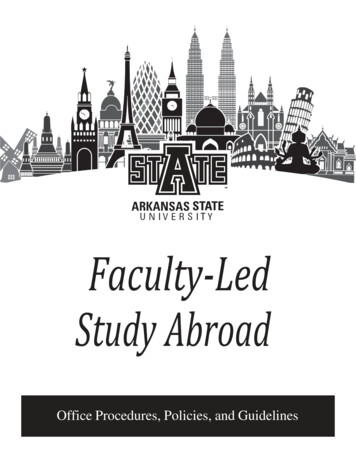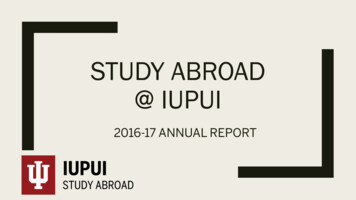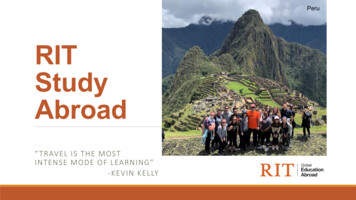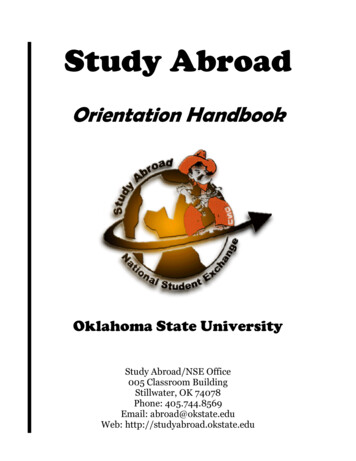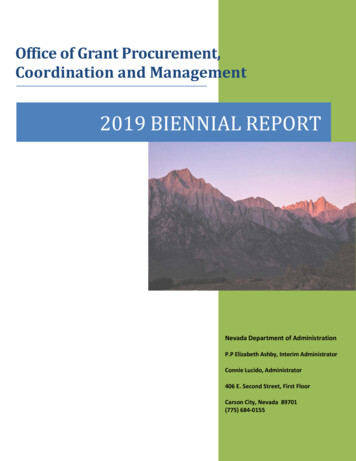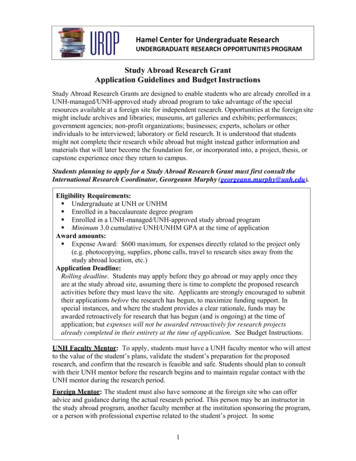
Transcription
Hamel Center for Undergraduate ResearchUNDERGRADUATE RESEARCH OPPORTUNITIES PROGRAMStudy Abroad Research GrantApplication Guidelines and Budget InstructionsStudy Abroad Research Grants are designed to enable students who are already enrolled in aUNH-managed/UNH-approved study abroad program to take advantage of the specialresources available at a foreign site for independent research. Opportunities at the foreign sitemight include archives and libraries; museums, art galleries and exhibits; performances;government agencies; non-profit organizations; businesses; experts, scholars or otherindividuals to be interviewed; laboratory or field research. It is understood that studentsmight not complete their research while abroad but might instead gather information andmaterials that will later become the foundation for, or incorporated into, a project, thesis, orcapstone experience once they return to campus.Students planning to apply for a Study Abroad Research Grant must first consult theInternational Research Coordinator, Georgeann Murphy (georgeann.murphy@unh.edu).Eligibility Requirements: Undergraduate at UNH or UNHM Enrolled in a baccalaureate degree program Enrolled in a UNH-managed/UNH-approved study abroad program Minimum 3.0 cumulative UNH/UNHM GPA at the time of applicationAward amounts: Expense Award: 600 maximum, for expenses directly related to the project only(e.g. photocopying, supplies, phone calls, travel to research sites away from thestudy abroad location, etc.)Application Deadline:Rolling deadline. Students may apply before they go abroad or may apply once theyare at the study abroad site, assuming there is time to complete the proposed researchactivities before they must leave the site. Applicants are strongly encouraged to submittheir applications before the research has begun, to maximize funding support. Inspecial instances, and where the student provides a clear rationale, funds may beawarded retroactively for research that has begun (and is ongoing) at the time ofapplication; but expenses will not be awarded retroactively for research projectsalready completed in their entirety at the time of application. See Budget Instructions.UNH Faculty Mentor: To apply, students must have a UNH faculty mentor who will attestto the value of the student’s plans, validate the student’s preparation for the proposedresearch, and confirm that the research is feasible and safe. Students should plan to consultwith their UNH mentor before the research begins and to maintain regular contact with theUNH mentor during the research period.Foreign Mentor: The student must also have someone at the foreign site who can offeradvice and guidance during the actual research period. This person may be an instructor inthe study abroad program, another faculty member at the institution sponsoring the program,or a person with professional expertise related to the student’s project. In some1
cases, the UNH Faculty Mentor and the Foreign Mentor may be the same – e.g. if thefaculty mentor is a UNH faculty member teaching in the study abroad program. In othercases, with the Hamel Center director’s approval prior to application, it may be possiblefor the UNH faculty mentor to serve this supervisory role via email contact. Contact theHamel Center for more information.All Study Abroad Research Grant application materials can be found esearch-grantsI. APPLICATION INSTRUCTIONS:1. Complete the Application Cover Sheet and Budget Form, carefully following theguidelines below.2. Give the UNH Faculty Mentor Recommendation Form (available online) to yourUNH mentor as soon as possible. Note: You must complete and sign the top portionof the recommendation form before giving it to your mentor. Determine from yourmentor whether s/he will give you the recommendation in a sealed envelope (forsubmission with the application) or if s/he will deliver the letter directly to the HamelCenter (either by hand delivery to 118 Conant Hall or electronically togeorgeann.murphy@unh.edu). Letters of recommendation should not be sent viacampus mail.3. Make sure you have a firm commitment from a foreign mentor. Beforeapplying, you should identify and communicate with an appropriate foreign mentor atthe site where you propose to do your research. You should also discuss the proposedresearch project with the foreign mentor, to ensure that all aspects of the project(research design, timeframe, budget) are manageable.The foreign mentor should provide a letter stating that s/he is willing to superviseyour research while abroad, and describing how s/he will assist you in your project.Give the Foreign Mentor Recommendation Form (available online) to yourforeign mentor. Note: You must complete and sign the top portion of therecommendation form before giving it to your mentor. This letter may be includedwith the application or sent directly to georgeann.murphy@unh.edu.4. Determine if your project will require approval from a University reviewcommittee. Certain types of research are subject to federal regulations andUniversity guidelines. For example, any projects involving interviews, surveys orquestionnaires – i.e. all having to do with human subjects – must receive approvalfrom UNH’s Institutional Review Board (IRB) before the research begins. Similarly,research involving vertebrate animals, infectious agents, DEA controlled substances,lasers, x-rays, hazardous chemicals, radioactive materials, carcinogenic material,recombinant or synthetic nucleic acid molecules, NMR/superconducting magnets,and/or patents and copyrights must receive approval from the appropriate Universityreview committee before the research begins. If you have questions about how toobtain research approval, talk with your faculty mentor or a Hamel Center staffmember. You do not need to submit written evidence of this approval with yourStudy Abroad Research Grant application; however, if you are granted an award, theHamel Center must receive confirmation of approval from the appropriate Universityreview committee before dispensing your award money. So, it is in your best interestto begin the approval process before or at the time of your application. For moreinformation, go to: uct-research2
5. Prepare a description of your proposed project by answering the ProjectDescription questions in Part I and Part II below.6. Ask both your UNH and foreign mentors to review a draft of your ProjectDescription, especially your proposal. Be sure to allow sufficient time for yourmentors’ review and comments before submitting your application.7. Complete the application with ample time left for obtaining the signature ofthe department chairperson on the application cover sheet. Students who arealready abroad at the time of application should request the mentor’s departmentchair to submit an email of approval directly to the Hamel Center:georgeann.murphy@unh.edu.8. Submit one complete application packet to the Hamel Center forUndergraduate Research. Collate the application materials in the following order: Application Cover Sheet Project Description (Parts I and II): See guidelines below. Budget Form: See Budget Instructions. (Remember to keep receipts for allresearch expenses, for submission upon your return to UNH.) The faculty mentor and foreign mentor letters may be submitted with theapplication (one original copy each, in a signed, sealed envelope), or submitteddirectly to the Hamel Center (either by hand delivery to 118 Conant Hall orelectronically to georgeann.murphy@unh.edu ). Letters of recommendation shouldnot be sent via campus mail.Students who are already abroad at the time of application may submit one completeapplication by fax, email, or postal mail. Contact the Hamel Center for further instructions.II.PROJECT DESCRIPTION:Part I: Foreign Research SiteOn a separate page (typed, double spaced), please answer the following questionsabout your foreign research site.1. Foreign Language Preparation:a. What is the language of the county/countries of your proposed research?b. What language will be necessary to conduct your research? What level of fluencywill you need? (For example, will you conduct interviews in this language? Readtexts? Have conversations with other researchers? Will you require a translator?)c. Briefly describe your background/preparation in this language. Include bothinformal training (e.g. previous travel/residency in this country), and formaltraining (e.g. the number of years you studied the language in high school; thecollege-level courses you have taken in the language to date).2. Foreign Mentor:a. Provide the following information for the person who will supervise yourresearch while you are abroad: Name Title and institutional affiliation Mailing address and email address Phone number and fax number (if available)b. What are his/her areas of expertise or professional background?c. In what ways will your foreign mentor assist and guide you in your research?d. Name any other contacts at your research site(s) who will help you conductyour research.3
3. Research Approval: Do you need prior approval/permission to gain access toyour proposed research site(s) and the resources available there? If so, how andwhen will you obtain written approval/permission?Part II: ProposalThe proposal should follow the outline below and address the issues and questionsnoted. Please limit your proposal to four or fewer pages (double spaced).1. Project Topic: What is the general problem, theme, or issue your project will address? What have other scholars, researchers, or artists done on this topic (i.e. what isthe most relevant previous research)? What is the specific question, hypothesis, or objective that your project will try toanswer?2. Project Location(s): What will be the specific location(s) for your research? Provide the name ofthe city/cities and country, as well as the name(s) of the specific site(s): e.g.library, museum, laboratory, organization, etc. Why is it necessary or advantageous for you to carry out this work whileabroad – and at the specific research site(s) proposed – instead of at UNH?3. Project Activities: Describe the activities you propose to carry out while abroad and how theywill enable you to address your proposed topic or to answer the question(s)you pose above. Be as specific and concrete as possible regarding data/information to becollected and from what sources (e.g., specific library or museum collectionsto be reviewed; individuals to be interviewed and questions to be asked ofthem; exhibits or performances to be attended). Also, indicate the time commitment (hours/days/weeks) you anticipate foreach of these activities. (If you like, you may produce a timetable showing thecommitment of hours/days/weeks for each research activity.) If you have already begun your research abroad, include a description of anyresearch activities you have already begun and/or completed toward yourproject, what you've learned, and how this contributes to your researchquestion.4. Project Purpose:Explain how your research abroad fits into your overall educational goals andlarger research plans. For example: Will the research be preliminary work for a subsequent honors thesis, futureresearch, or another project? If so, explain how it fits into the larger/morecomprehensive project. Will the research be a foundation for graduate school or for your professionalcareer? Explain. If the proposed work comprises a self-contained project, indicate its potentialeducational, personal, and/or professional value to you.4
5. Background/Preparation:Briefly describe your background and preparation to undertake these researchactivities abroad. For example: coursework, including study abroad coursework previous study or research on the general topic and on the country/culture training in research methods/approaches necessary to the projectIII. BUDGET FORM INSTRUCTIONSIn consultation with your Faculty Mentor, determine as accurately as you can yourestimated research expenses. List each item and its exact cost per unit, and brieflynote its importance to your project. Identify the most critical items in your budget.You may request up to a maximum of 600, so it is important that you work withyour mentor(s) to prioritize your expenses. Expense awards only cover costs directlyrelated to the completion of your research activities. They do not cover the cost ofcopying a thesis or research paper, or costs associated with presenting research, suchas research posters.Note: The Hamel Center may not be able to fund all your research expenses. It isunderstood that the budget represents your best estimate of the costs. To maximizefunding support, you are strongly encouraged to submit your application before theresearch has begun. In special instances, and where the student provides a clear rationale,funds may be awarded retroactively for research that has begun (and is ongoing) at thetime of application – as long as you’ve kept all expense receipts. If you are granted anaward, you will need to submit these receipts to the Hamel Center upon your return toUNH. You may not, however, seek retroactive expenses “after the fact” for research thathas already been completed in its entirety. Your application must be received eitherbefore research has begun or while research is still in progress. Supplies: These include, but are not limited to: note-taking supplies (e.g. paper,notebooks, pens, pencils), art supplies, supplies for lab or field work (e.g. chemicals, labanimals, etc.). You should provide the exact cost of each item. You may do this by talkingto your UNH or foreign mentor, looking through supply catalogs, or shopping around. Travel Expenses: The Hamel Center does not cover the cost of travel to or fromyour study abroad program; the cost of meals; or trip insurance. Travel expenses mayinclude travel to research sites once you are at the location of your study abroadprogram. These might include travel to libraries, archives, museums, labs, exhibits,performances, or to conduct field research or interviews. If you are required to stayovernight at the research site, you may include the cost of lodging. Other Expenses: This category refers to any expenses in the following areas—photocopies, phone calls, postage, special fees for access to research sites, or servicesrendered—along with any expenses that might not be covered within the othercategories. Most of these items should be calculated by the number needed for yourresearch project and the exact cost for each. For example, 100 photocopies multipliedby 10 cents per page will give you the total amount of 10 needed by you. (Keep inmind that photocopying of rare documents or manuscripts can be especiallyexpensive.) For services rendered, you should contact the person or site where thework will be done for an estimate of the cost.5
Permanent Equipment: While the Hamel Center is willing to provide support forpermanent equipment necessary to your research project, we may request that yourhome department share the cost of such equipment. Non-expendable items purchasedwith Study Abroad Research Grant funds (e.g. books, computer software, musicrecordings/sheet music, electronics, mechanical equipment) are University propertyand must be returned to the University once the project is complete. Note: Equipmentexpenses may not include digital voice recorders or similar recording equipment, butthe Hamel Center does have a small number of digital voice recorders available forloan during the research period. If you will require such equipment for your research,please note this on your budget form under “Contributions from Other Sources.”Final Note: The online Budget Form was created as a table in Microsoft Word, so youshould be able to manipulate it to fit your needs. You may enter information on the formelectronically, save it, and return to it later for completion. Also, if you need more space,you may add rows to the form or attach a separate document to the form that follows thesame format.IV. CRITERIA FOR REVIEW OF APPLICATIONS:A. sufficient knowledge of resources and contacts at the research siteB. evidence of adequate qualifications, preparation, and experience for projectC. clarity of research question, objectives, and purposeD. manageability of project in the time period allowedE. manageability of project in light of possible cultural/language barriersF. emotional and intellectual maturity of studentG. ability of the student to be a good representative of the U.S. abroadV. NOTIFICATION:All applicants and their faculty mentors will be notified in writing within two weeks.VI. FINAL REQUIREMENTS OF AWARD RECIPIENTS:In addition to the expectation that you will conduct/complete the research projectproposed in your application, the Study Abroad Research Grant comes with thefollowing requirements:a. Final Report: describing your project and your findings (1000-1500 words).b. Final Evaluation: to be completed electronically by you, your faculty mentor,and your foreign mentor.c. Letter of Appreciation: to be written and sent by you to your sponsoring donor.Presentation of Research: Study Abroad Research Grant recipients are stronglyencouraged (though not required) to present the results of their research in anappropriate forum (e.g., to a class, to department majors and/or faculty, at an onor off-campus conference).Questions? undergrad.research@unh.eduHamel Center for Undergraduate Research118 Conant Hall (603) 862-43236
study abroad location, etc.) Application Deadline: Rolling deadline. Students may apply before they go abroad or may apply once they are at the study abroad site, assuming there is time to complete the proposed research activities before they must leave the site. Applicants are strongly encouraged to submit

